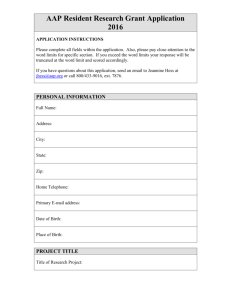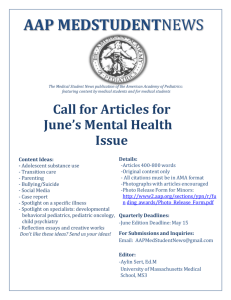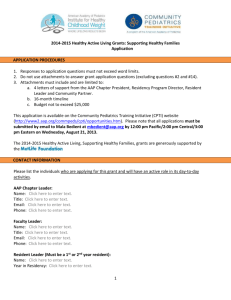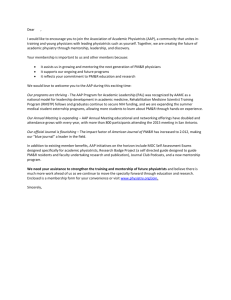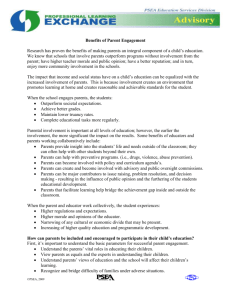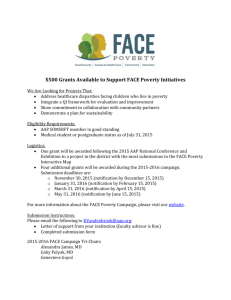AAP-PSEA Task Team Meeting Notes, 31 March 2014
advertisement
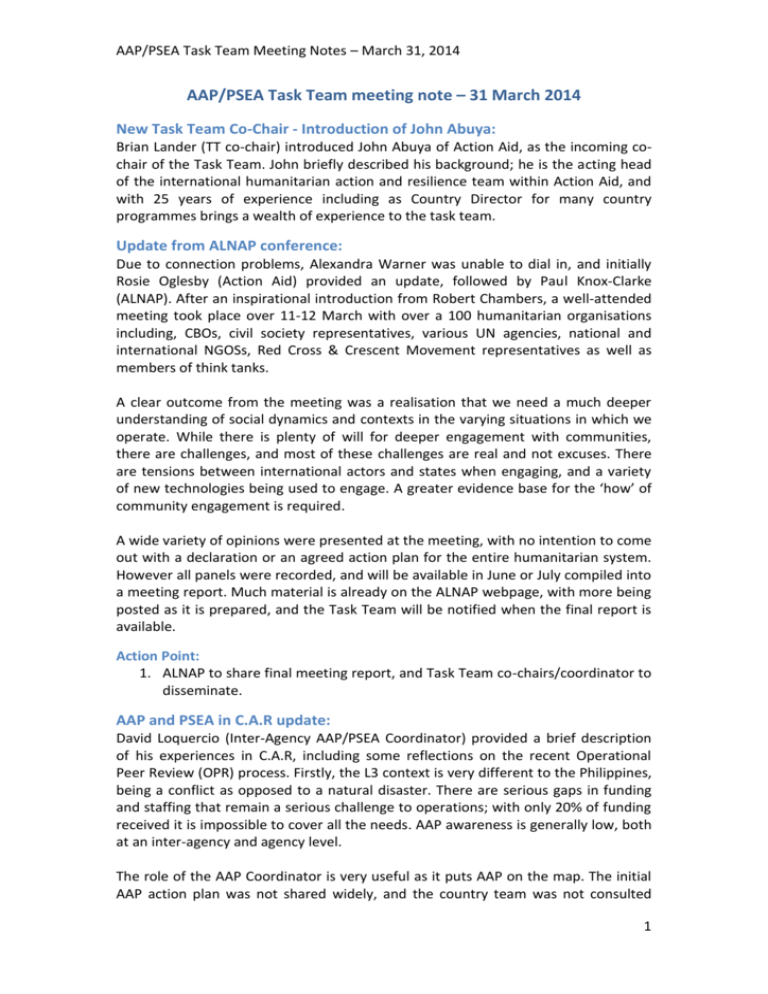
AAP/PSEA Task Team Meeting Notes – March 31, 2014 AAP/PSEA Task Team meeting note – 31 March 2014 New Task Team Co-Chair - Introduction of John Abuya: Brian Lander (TT co-chair) introduced John Abuya of Action Aid, as the incoming cochair of the Task Team. John briefly described his background; he is the acting head of the international humanitarian action and resilience team within Action Aid, and with 25 years of experience including as Country Director for many country programmes brings a wealth of experience to the task team. Update from ALNAP conference: Due to connection problems, Alexandra Warner was unable to dial in, and initially Rosie Oglesby (Action Aid) provided an update, followed by Paul Knox-Clarke (ALNAP). After an inspirational introduction from Robert Chambers, a well-attended meeting took place over 11-12 March with over a 100 humanitarian organisations including, CBOs, civil society representatives, various UN agencies, national and international NGOSs, Red Cross & Crescent Movement representatives as well as members of think tanks. A clear outcome from the meeting was a realisation that we need a much deeper understanding of social dynamics and contexts in the varying situations in which we operate. While there is plenty of will for deeper engagement with communities, there are challenges, and most of these challenges are real and not excuses. There are tensions between international actors and states when engaging, and a variety of new technologies being used to engage. A greater evidence base for the ‘how’ of community engagement is required. A wide variety of opinions were presented at the meeting, with no intention to come out with a declaration or an agreed action plan for the entire humanitarian system. However all panels were recorded, and will be available in June or July compiled into a meeting report. Much material is already on the ALNAP webpage, with more being posted as it is prepared, and the Task Team will be notified when the final report is available. Action Point: 1. ALNAP to share final meeting report, and Task Team co-chairs/coordinator to disseminate. AAP and PSEA in C.A.R update: David Loquercio (Inter-Agency AAP/PSEA Coordinator) provided a brief description of his experiences in C.A.R, including some reflections on the recent Operational Peer Review (OPR) process. Firstly, the L3 context is very different to the Philippines, being a conflict as opposed to a natural disaster. There are serious gaps in funding and staffing that remain a serious challenge to operations; with only 20% of funding received it is impossible to cover all the needs. AAP awareness is generally low, both at an inter-agency and agency level. The role of the AAP Coordinator is very useful as it puts AAP on the map. The initial AAP action plan was not shared widely, and the country team was not consulted 1 AAP/PSEA Task Team Meeting Notes – March 31, 2014 when drafting the plan, and so little follow-up had taken place. The plan has now been revised and contextualised by David, and will soon be endorsed by the HCT, providing greater legitimacy. There is improved senior level management commitment to AAP. Clusters have been supported on AAP in a variety of ways, including developing a communications plan on return conditions with the CCCM cluster. A C.A.R specific PSEA Code of Conduct has been developed and issued. Discussing accountability during on-going L3 crises is not the most effective way of encouraging AAP. AAP needs to be a preparedness issue, and needs to be better integrated in budgets, for instance there are no funds for post-distribution monitoring. There is a need to think more about practical solutions as well as giving more time to Communications with Communities. Decision making power remains with large agencies that hold funds, but these decisions are not communicated to affected populations. Smaller implementing organisations are expected to deliver the often unwelcome news regarding operational planning. If the large agencies were themselves facing the communities with these decisions they possibly wouldn’t be made in the first place. There is a lack of clarity within OCHA and others of the distinctions between CwC and AAP. PSEA issues have been picked up but there remains a low degree of awareness, and better systems need to be established. There are plans to replace David when he finishes his mission (6 months post). There remains a lack of clarity on who should take the lead on collective accountability. C.A.R Operational Peer Review discussion. Brian Lander mentioned that the OPR pointed at fundamental issues, we need to ask what does accountability look like at a collective level? For the L3 declaration in South Sudan neither the IASC Principals, nor the Emergency Directors Group asked for an AAP Action Plan to be developed by the Task Team – evidence that the process needs to be driven by the HCT. In South Sudan the Task Team has contacted the HC to offer support, but as yet there is no reply. There are a number of PSEA focal points in C.A.R, and we need to offer them support. David highlighted that the PSEA working group was also a peer learning group, and there is a need to link the working group to PSEA focal opijnts in the respective agencies. Christine Bendel suggested that an online advisory support team be established, with Yasna Uberoi and Luc Ferran leading. This was agreed. Lucy Heaven asked that the PSEA Working Group list be shared with the Task Team. Rosie Oglesby highlighted that in the Philippines there is still a lot of confusion at the cluster level on the roles and responsibilities of the clusters - what are we expecting the clusters to do around AAP? David provided an example from the food security cluster. With the planting season coming up, David worked with them on information sharing, feedback mechanisms and other topics. The greatest shortcoming is a lack of information on living/security conditions in places of origin for IDPs. There is some work being done by the CCCM cluster here, and a variety of other projects including digital information sharing technologies. 2 AAP/PSEA Task Team Meeting Notes – March 31, 2014 The role of OCHA guiding the inter-cluster group to be accountable is still unclear – is it a definite part of their function? Matthew Serventy pointed out that at a global level clusters don’t have a common approach on AAP. Where PSEA is clearly an agency responsibility, clusters have some AAP responsibility. Different clusters take varying positions, some putting AAP responsibilities onto their individual members, while others claim a collective responsibility. Despite this, when a discussion is had with clusters that say they are accountable, it can become apparent that they still believe only members are truly accountable, and not the collective. Barb Wigley highlighted the potential role here for NGO cluster members to drive the accountability agenda. Brian Lander suggested that the Task Team focus on a non L3 crisis and again look at a collective AAP approach and how to go about it in a more ‘preparedness’ phase. April Pham (via email) asked if there were specific observations regarding how gender was considered and addressed in the CAR emergency as per the OPR, if there were interactions/synergies with the GenCap in country and if there are any specific recommendations? David responded that he had not seen the second version, but in the first there was nothing on Gender, which is definitely an issue. The AAP and GenCap advisors were in touch, and in a review of projects by GenCap using the gender marker only 2 were remotely compliant. The self-assessments of the OPR showed AAP as weak and gender rated as ‘OK’. He also highlighted that as AAP and gender are linked, poor accountability will inevitably mean poor consideration of gender. Action Points: 2. Yasna Uberoi and Luc Ferran to establish an online support group for the PSEA working group in C.A.R. All interested please contact - uberoi@un.org & Luc.Ferran@rescue.org 3. David Loquercio to share the PSEA Working Group list for C.A.R World vision update on the DFID beneficiary Feedback Project: Naomi Opiyo provided a briefing on the DFID feedback project running together with World Visions UK, Frontline SMS, and INTRAC working together for almost 1 year now operating in 7 countries, including; Kenya, Tanzania, Somaliland, Zimbabwe, India, and Ethiopia. A key learning is that more time needs to be spent in the programme design stage, particularly in context analysis. It is essential to understand social and power dynamics, cultural structures and decision making processes. The context analysis in six projects is already complete, and the feedback process is in three levels. The projects will be starting in May, and the effectiveness of the feedback mechanisms will be shared from then on. INTRAC is managing data and ensuring value for money. As many of the projects are focused on maternal health most beneficiaries are women, who have their own preferences on how they want to give feedback. Issues of confidentiality about sensitive complaints and fears around the feedback process are important to address. There are literacy issues to take into account, and how to involve men in the feedback process is also important to make sure it has been agreed by all in the community. 3 AAP/PSEA Task Team Meeting Notes – March 31, 2014 Lucy Heaven asked for a description of the three different levels of feedback, and asked that if the feedback mechanism is so contextual, how can we replicate the learning in other environments? Naomi outlined the three levels; a) Low resource approach – using mobile technology (Frontline SMS) through unsolicited SMS feedback. This now also includes hotline calls due to literacy and sensitivity issues. b) Medium resource approach – introducing public information campaigns about feedback mechanisms, implementing partners decide on questions to ask, and beneficiaries decide on ‘how’ to feedback - report cards, reference groups or adaptation of M&E tools, etc. c) High resource approach – context analysis most important here, with a higher level of choice of mechanisms, including setting indicators and developing scorecards. In terms of replicating learning, by comparing the seven projects some similarities will become evident. Despite the varying contexts, the similar target groups, partners and projects will likely provide some similar results. Christine Bendel asked why do the mechanisms need to be explained to the men? Naomi pointed out that men have become suspicious that the feedback may in fact be about them. As it is a confidential system, no feedback will be revealed, but a briefing on the system must be given to men, and it is important that men are involved to an extent in wider programming. UN Habitat presentation on AAP in Urban Areas Szilard Fricksa provided a detailed briefing on how UN Habitat has been using a new ‘neighbourhood’ profiling model over the past years, but most recently in Syria to establish the needs of urban communities from a multi-sector perspective. The Presentation is attached to the minutes. Szilard highlighted that the urban profiling could work in rural areas, however was best suited to high population concentrations. Information is collected from secondary sources and neighbourhood focus groups, and in the case of Syria, damage and functionality maps are compared. It is clear that more support is required for host families within and surrounding Syria, and the approach uses multisector trend indicators, rather than impact or delivery indicators. Trend analysis shows that community needs change over time, from basic infrastructure such as road repair to land tenure and community loans. The neighbourhood approach allows a more in-depth analysis of a community’s needs, but can the system adapt from a sectoral approach to a multi-sector neighbourhood one? In response to a series of questions, Szilard indicated that; it would be possible to develop a template of context analysis questions to better understand local power contexts, communities would be able to set their own indicators to use as part of the monitoring and social audit, the unit of measurement was the neighbourhood as defined by the community, that partners are being sought to roll out the approach more widely, but at the moment the Syria region remained the priority. 4 AAP/PSEA Task Team Meeting Notes – March 31, 2014 There is an opportunity to build an ‘accountability habit’ in the CBOs and civil society involved in the approach, and we need to examine how to leverage information the approach collects. As Syria is a middle income country, we must develop links to existing capacity. The Task Team members are invited to engage with UN Habitat in this work with a view to strengthening AAP in this approach. Action Points: 4. Matthew to share presentation (annexed to minutes) 5. Szilard to forward relevant data and findings to the task team, and Task Team members to engage with Szilard in supporting AAP in the approach. Update on the PSEA Recruitment Report to the IASC Principals Christine Bendel described how the Principals endorsed the whole report, agreeing to the strengthening of recruitment processes. A PSEA team looking at new measures came up with fourteen recommendations for UN agencies and six for NGOs. Records of misconduct were raised, for example the convicted rapist who took on a position with an NGO working with children in another country. There must be an examination of what organisations can do to screen applicants in recruiting? While the Task Team is working on this, it is the responsibility of every individual agency. Christine is soon leaving her position, and can no longer be the lead on this issue. There should be a small team developed to investigate PSEA and recruitment, with a new leader to replace Christine. Christine can provide a short statement outlining what the scope of such a team would be. Action Points: 6. Christine to prepare a short statement on potential HR/PSEA team scope. 7. Matthew to share the statement with Task Team. 8. Volunteer to lead in place of Christine required. Updates on Work Plan Objectives: At the last meeting it was decided that written updates on Task Team activities would be provided by lead agencies, compiled by the Task Team Coordinator and then shared with the Task Team generally. Thus far only Action Aid and OCHA provided updates, and it was decided that other updates could be provided by Friday April 4th for sharing next week. Action Aid proposed a small virtual working group to work together at global level on developing a generic community awareness/training module that can be contextualised for country level pilots. Drawing on learning from C.A.R and the Philippines and existing materials already available from individual agencies, as well as HAP, Sphere, CDAC etc., the group could and adapt/ build on this to develop a common framework. There is a possible pilot project to be initiated in the Philippines. Action Aid offered to lead such a group, Andy Wheatley (via email) offered to take part. David responded that he has developed some material in 5 AAP/PSEA Task Team Meeting Notes – March 31, 2014 French, and would be interested in such a group. People willing to contribute to this group, should contact Rosie Ogelsby in Action Aid. David Loquercio (via email) commented that the activities of the work plan have a crucial role in reinforcing preparedness and the capacity of organisations to be accountable individually and collectively at field level. In terms of pilots and field support, HAP remains committed to being involved in planning and implementing these. He will continue to support the C.A.R remotely and try to ensure we capitalise on the experience there. Regarding Myanmar, HAP will be involved in a long-term project with the 3MDG fund and there may be synergies to be found there and further deployments are to be expected this year. David also voiced concern regarding the note from OCHA on the development of the resolution on AAP and that it should be rebranded aid effectiveness, a term that has been turned into something so broad it is meant to include everything. He thinks we need to take a more proactive approach in explaining what AAP means and why it is a shared responsibility of humanitarian organisations and member states, which is acknowledged already by most stakeholders under various names. If human rights activists had taken the same approach, maybe there would not be a charter for human rights so I think we need to advocate and explain until the message is understood. There was a brief discussion on the AAP and CwC paper planned by CDAC in relation to the Action Aid mention of this in their update. Barb Wigley questioned the process, and wondered about the mandate of the final paper. Angela Rouse informed that the paper is still being worked on, and hopefully will be shared by the end of the month. It is a research paper, twenty five people from different agencies were interviewed looking at differences and similarities between AAP and CwC. It is not a position paper, but a work of research. Brian Lander informed that Patty McIlreavy has stepped down from her role as Task Team sponsor in the Working Group. This has sparked a discussion within the Working Group on the roles and responsibilities of Task Team sponsors, and has also meant the WG will consider who should be the replacement sponsor. Brian also informed that the WG is considering prioritising work plan activities to prepare for the eventuality that the Emergency Directors or the WG may ask teams to include new activities in their work plan. It is not clear what this will mean in practice, but clearly dialogue with the Task Team will be essential. Action Points: 9. All lead agencies to provide updates on their activities by Friday April 4 th. (Compiled updates to be annexed to minutes) 10. Action Aid to establish a small virtual working group developing community awareness and staff training modules. Anyone interested in taking part should contact - Rosie.Oglesby@actionaid.org 6 AAP/PSEA Task Team Meeting Notes – March 31, 2014 Any Other Business: CBCM update Tristan Burnett provided an update on the CBCM pilot project. Proposal is with ECHO, hopefully the last submission, with 1.1 million€ funding requested. UNHCR has stepped down from the project. Specific sites have not been identified, but will be based on needs assessment. Additional activities on psychosocial/medical/legal care have been added, and further funding will be required for these. Haiti is no longer part of the pilot. There has been insufficient time for agencies on the ground, the fluid nature of the context, have meant there is no time to find a new site. There is a plan to appeal for further funding beyond ECHO, assuming the ECHO funding comes through, there is hoped to be a domino effect. Philippines AAP Coordination staff Philippines Inter-Agency AAP Coordination staff are required ASAP. A National AAP Coordinator (6 months) and an International (3 months with the option to extend 3 months); both based out of Tacloban. TORs will be released by OCHA shortly. People Centred XCI’s report Siobhán Foran (IFRC), co-chair of the IASC Gender Reference Group (GRG) and Delphine Brun, GenCap Adviser with the Global Clusters, met with the Chief of HCSS, OCHA to discuss the proposed follow-up to Piero Calvi’s Strategic Review on the Coordination and Funding of Cross-Cutting Issues and the representation of XCIs within the GCCG. As a result of this meeting, the GRG called a meeting with representatives of the AAP/PSEA Task Team, GenCap, HelpAge (on aging), Handicap International (on disabilities), the Coordinator of the MHPSS Reference Group (from War Trauma Foundation) and UNHCR (for HIV AIDS) to discuss a consolidated response to the HCSS/GCCG on the Strategic Review. While agreeing a common response would be useful, the suggested time frame (i.e. end of April) is too short. The IASC GRG has contacted the HCSS to ask that the discussion on the Strategic Review be postponed to the GCCG’s May meeting, GenCap and the Task Team will work together on developing a framework of questions to be answered by all the various people involved. The timeline and framework will be shared next week. Action Points: 11. Coordinator to share timeline and framework by Monday 7th April. 12. All to respond according to interest to XCI report once framework and timeline shared. HAP conference - do complaints mechanisms work? The conference is on 8 May, and is followed by a PSEA practitioner’s day on the 9 th. All welcome, please contact – Karen Glisson - kglisson@hapinternational.org AAP positions currently vacant There is an AAP position currently vacant in FAO headquarters. There are also positions about to be opened in CAR and the Philippines. 7 AAP/PSEA Task Team Meeting Notes – March 31, 2014 1 2 3 4 5 6 7 8 9 10 11 12 13 14 15 16 17 18 19 20 21 22 23 24 25 26 27 28 29 30 31 32 33 34 35 Online or In person Online Online Online Online Online Online In person Online Online Online Online Online Online Online Online Online Online Online Online Online Online Online In person In person In person In person In person In person In person In person In person In person In person In person In person Meeting Attendance Name David Loquercio Rosie Ogelsby Christine Bendel John Abuya Barb Wigley Sara BELFRAGE Luc BRANDT Alexandra Warner Christine Nichols Paul Knox Clarke Naomi Opiyo Madara Hettiarachchi Angela Rouse Luc Ferran Lilliana Zoldi Sonia Rastogi Sonja Pierings Richard Cobb Anita Bay Siobhan Foran Sophie Martin-Simpson Manish Thomas Karen Glisson Ester Dross Massimo Nicoletti Brian Lander Rebecca O’Kusky Etienne Lacombe-Kishibe Lucy Heaven Taylor Szilard Fricksa Isabelle Robinson Tristan Burnett Beris Gwynne Matthew Serventy Carl Hennung Organisation HAP Action Aid UNDP Action Aid WFP WFP UNCHR ALNAP Interaction ALNAP World Vision World Vision CDAC Rescue International IMC WRC UNFPA Merlin Save the Children IFRC Save the Children ICVA HAP Independent HAP WFP UNDP World Vision Independent UN Habitat UNHCR IOM World Vision AAP/PSEA Task Team WFP 8
